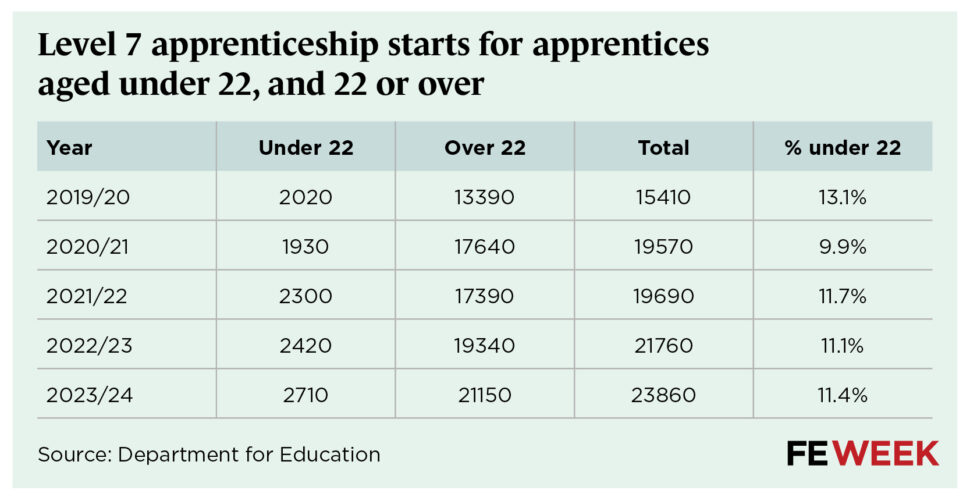The vast majority of level 7 apprentices will be ineligible for government funding under new age-based restrictions, new data reveals.
From January 2026, the Department for Education will only fund new Master’s level apprenticeships for apprentices who are aged 21 and under. Ministers said this will “rebalance” funding towards lower-level training, where it would have the most impact.
Existing apprentices can continue as planned.
New data published today in response to a written parliamentary question from shadow education minister Neil O’Brien shows that 11 per cent, one in nine, level 7 apprenticeship starts in recent years have been under 22.

O’Brien told FE Week: “Huge numbers of employers and educators have warned the government about the disastrous effect this cut will have on the public services and on access to the professions for the less well off. But they have done it anyway”.
Until now, the sector has relied on government apprenticeship statistics to assess the impact of the removal of level 7 funding, which presents apprentices as under 19, 19 to 24 or 25 and over.
Today’s figures show that in the most recent full academic year, 2023-24, 2,710 of the total 23,860 new level 7 apprentices were under 22 when they started.
The new data doesn’t list standards, but previous FE Week analysis showed the accountancy and tax professional and the solicitor apprenticeships were the most popular for younger learners and are therefore the least affected by January’s funding change.
But the rest are likely to become unviable. This includes the senior leader apprenticeship, which had over 7,000 starts last year, as well as the advanced clinical practitioner degree apprenticeship.

O’Brien said: “It is shameful that they have snuck this out as soon as the commons is not sitting, and more shameful to have sat on the information that this is a 90 per cent cut until after the announcement was made.
“It is just total contempt for the people delivering these life-changing apprenticeships.”
Numbers starting level 7 apprenticeships are expected to rocket this year before the tap get turned off in the new year.
Employers wishing to continue with level 7 apprenticeships for learners aged 22 and over after December will need to pay for them themselves.
Yesterday’s announcement also confirmed that the apprenticeship budget for 2025-26 will be a record £3 billion, drawn from the record £4.2 billion in levy payments by employers, for that year.
The government pledged 120,000 new training places for young people and new construction courses and skills bootcamps for adults.
Business critics
Business groups have argued that placing the cap at age 21 restricts access to top professions to young people who don’t go through an academic pathway through education.
Lizzie Crowley, senior skills adviser at the CIPD, said: “The decision to restrict government funding for all level 7 apprenticeships to those aged 16 to 21 is unlikely to meaningfully boost youth participation, given that fewer than one in 10 apprentices who train at this level fall within this age bracket.
“While the aim of rebalancing the system towards young people is important, this blunt approach risks undermining the breadth and ambition of the apprenticeship offer. We have previously argued for a more nuanced approach to managing the cost of delivering higher-level apprenticeships, for instance via reduced subsidies for older apprentices.”
Petra Wilton, director of policy at the Chartered Management Institute, said: “The government’s decision to restrict level 7 funding does not address the UK’s ongoing skills gap in management capability. In practice, this wipes out virtually all funding for the senior leader apprenticeship.
Senior leader apprentices are “overrepresented by people who were on free school meals and who were the first in their families to go to university”, she said.
Meanwhile, the Russell Group warned the move could see universities scrap other apprenticeship programmes.
Policy manager Jamie Roberts said: “As well as the direct impact, universities across the sector will be concerned about the effect on wider apprenticeship provision. Without level 7 it may not make economic sense for some to continue with any apprenticeship provision”.
Ben Rowland, chief executive of the Association of Employment and Learning Providers (AELP) said the level 7 announcement was “a disappointment” but “delaying implementation to the start of 2026 is a sensible step and gives some time for adjustment”.















Is Jamie admitting the Senior Mgmt Standard is a cash cow that cross subsidises all the other work, there, because I don’t think that’s a very strong argument for keeping it…
The connection between level 7 apprenticeships and social mobility is bogus. This is not about helping those less fortunate – those shouting loudest have the most to lose and have earned a great deal so far by ignoring that apprenticeships are a JOB ROLE related pathway – the higher the level, the higher up the job role and responsibility.
Entry points to the workplace were disregarded by many providers because of the funding level or were simply unavailable with level 2 apprenticeship standards being removed without good reason.
Starting someone as an apprentice should be at an entry level with progression towards higher responsibility over time.
Progressing someone into higher responsibility makes sense for apprenticeships too but level 7?? That is Doctor/C-suite/Senior Engineer – the demand is being driven by BD teams as a free way to maximise levy spending and deliver courses to those already in post – this helped firms spend their levy and “apprentices” – often senior employees, gain qualifications that would have otherwise cost them money.
It is time to look at apprenticeships as a progression pathway rather than looking at the money first and work backwards.
Spot on!